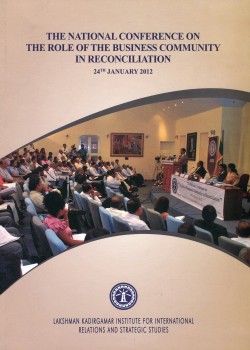
The National Conference on the Role of the Business Community in Reconciliation
24th January 2012
Publisher: Lakshman Kadirgamar Institute for International Relations and Strategic Studies
Place of Publish: Sri Lanka, Colombo
Year: 2012
Page Numbers: 39
Acc. No: 4580
Class No: 338.9 NAT-SL
Category: Books & Reports
Subjects: Development
Type of Resource: Monograph
Languages: English
A “National Conference on the Role of the Business Community in Reconciliation” was hosted by the Lakshman Kadirgamar Institute for International Relations and Strategic Studies (LKIIRSS) on Tuesday, 24th January, 2012. Members of the business community and experts on reconciliation presented on their contribution to the national reconciliation process at the conference, as Sri Lankan businesses have contributed appreciably to the reconciliation process by investing in Sri Lanka's Northern and Eastern provinces. The private sector's involvement in the reconciliation process has the power to transform the devastating effects of a three-decade long war, and this can be achieved if every organization formulated a ‘Reconciliation Action Plan (RAP)' so that each organization is part of the national reconciliation process. Presentations were made by ten eminent persons from the business community and experts in reconciliation. The speakers of the conference, industry leaders and pioneers in bringing reconciliation through business initiatives, shared their experiences in investing and working with the people of the north and east, successful not only in business terms, but successful in bringing about true reconciliation by building trust, friendships, and giving hope to those who would have otherwise had no hope in securing an income, in integrating into society and the national economy, or travelling and learning about other parts of Sri Lanka. The private sector, then rightly deemed the “engine for growth”, can make a vital contribution to the national reconciliation process by providing commercial investment in areas that were affected by the conflict, and thereby bring in ‘economic multipliers' to such underdeveloped areas which provide momentum for future development, such as distribution networks, financing mechanisms, access to markets, and training and human resource development. Organizations can also employ conflict-affected people, including former combatants, enabling social re-integration of such individuals and contribute to their economic well-being, which is an essential aspect of fostering reconciliation. Additionally, it is indeed in the long-term interest of the private sector to achieve a sustainable peace in Sri Lanka, and a strategic partnership can be forged between the government, private sector and community organizations for post-conflict reconciliation and reconstruction. Reconciliation is paramount in creating a harmonious society. Reconciling the hearts of all those who have been directly or indirectly affected by the conflict is without a doubt the first step in the path to attaining peace. Permanent peace can truly be brought about if all members of a society embrace and sustain it. The reconciliation process should lead to political, social, psychological, and economic fulfillment. Thus, reconciliation cannot be achieved by the directives of the state alone. Reconciliation requires the support and involvement of all Sri Lankans and many segments of society, such as the business community, media, clergy, academia, educationalists, and non-governmental organizations.



